Lien entre le syndrome de l’intestin irritable et diverses pathologies
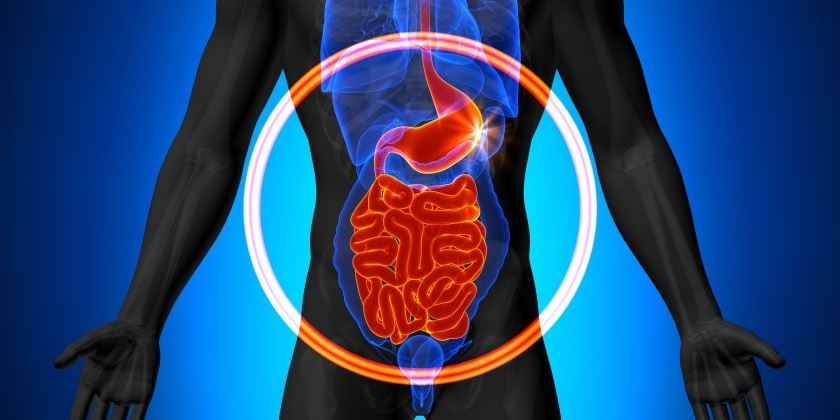
Parmi les patients souffrant de l'intestin irritable se trouvent des personnes souffrant de la maladie cœliaque ou des gens allergiques au blé ou au gluten non diagnostiqués. On a également souvent observé un lien avec des dépressions et des angoisses.
Le lien entre le syndrome de l'intestin irritable (SII ou en anglais IBS (irritable bowel syndrom)) et d’autres types d’affection fait l’objet de controverses. Dans la mesure où les symptômes multiples et non spécifiques du SII ne sont pas clairs, il semble difficile d’affirmer avec certitude l’existence d’une co-prévalence avec d’autres pathologies. Le SII se retrouve souvent associé à des troubles somatiques et psychiques. Ce qui est sûr, c’est que les patients SII présentent fréquemment des allergies alimentaires. D’où la nécessité de poser en amont un diagnostic précis. Jusqu’à présent, aucune étude de la prévalence de la maladie cœliaque parmi les patients souffrant de SII n’a donné de résultats probants. Les médecins avancent des chiffres allant de 0,4 à 11%. On suppose que parmi les patients souffrant de l'intestin irritable se trouvent des personnes ayant une sensibilité au gluten non coeliaque. Pour plus de certitude, il faut effectuer un diagnostic permettant d’exclure la maladie cœliaque avant de mettre en œuvre un régime sans gluten. Si les symptômes régressent au bout d’une à deux semaines, les suspicions de sensibilité au gluten non coeliaque seront confirmées. En dehors des intolérances alimentaires, de la maladie cœliaque et de la sensibilité au gluten non coeliaque, il faut, en cas de douleurs abdominales, pousser les investigations en effectuant un diagnostic différentiel.
Pour ce qui est des personnes souffrant du SII, on devra toujours prendre en compte la composante psychologique, voire la traiter. Chez les enfants ayant des douleurs abdominales fonctionnelles, tout porte à croire qu’il y ait un lien entre le SII , la dépression et les crises d‘angoisse. Il semblerait que les maux de ventre chroniques dans la petite enfance induisent à long terme un risque plus élevé de souffrir de douleurs abdominales, de symptômes somatiques (maux de tête), ainsi que des troubles psycho-sociaux, comme des crises d’angoisse, ce qui altère la qualité de vie personnelle et sociale.
Pour ce qui est des personnes souffrant du SII, on devra toujours prendre en compte la composante psychologique, voire la traiter. Chez les enfants ayant des douleurs abdominales fonctionnelles, tout porte à croire qu’il y ait un lien entre le SII , la dépression et les crises d‘angoisse. Il semblerait que les maux de ventre chroniques dans la petite enfance induisent à long terme un risque plus élevé de souffrir de douleurs abdominales, de symptômes somatiques (maux de tête), ainsi que des troubles psycho-sociaux, comme des crises d’angoisse, ce qui altère la qualité de vie personnelle et sociale.
Conseils pratiques pour dépister une maladie cœliaque dissimulée par un syndrome de l’intestin irritable.
- Tout patient présentant des symptômes induits par le gluten devra effectuer une recherche sérologique et une biopsie.
- Effectuer un dépistage de la maladie cœliaque sur toute personne présentant les aspects du syndrome de l’intestin irritable avant de confirmer le diagnostic de SII.
- Si le diagnostic de la maladie cœliaque n’a pu être établi avec certitude ou si la maladie cœliaque n’a pu être exclue, il faut consulter un gastro-entérologue.
- Si les examens ont permis d’exclure la maladie cœliaque et que le patient présente néanmoins des troubles associés au gluten, on peut envisager la mise en place d’un régime sans gluten sous surveillance médicale.
Plus d'informations à ce sujet
Présentation
3
Montrer tout
Études
3
Montrer tout
Vidéo
2
Montrer tout
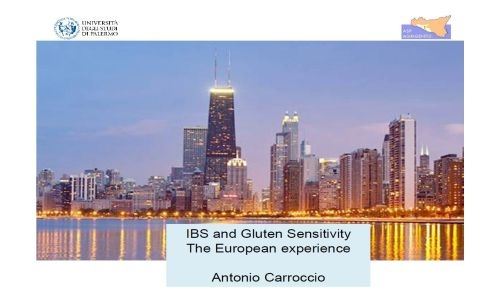
IBS & Gluten Sensitivity: The European experience (2013)
Antonio Carroccio
Direttore Medicina Interna presso ASP AG
Palermo, Italy
15e International Celiac Disease Symposium à Chicago du 22 au 25 septembre 2013
Direttore Medicina Interna presso ASP AG
Palermo, Italy
15e International Celiac Disease Symposium à Chicago du 22 au 25 septembre 2013
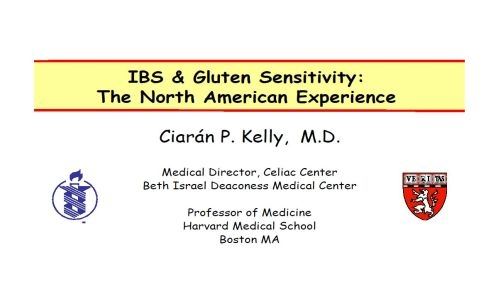
IBS & Gluten Sensitivity: The North American Experience (2013)
Ciarán P. Kelly, M.D.
Medical Director, Celiac Center
Beth Israel Deaconess
Professor of Medicine
Harvard Medical School
Boston MA, USA
15e International Celiac Disease Symposium à Chicago du 22 au 25 septembre 2013
Medical Director, Celiac Center
Beth Israel Deaconess
Professor of Medicine
Harvard Medical School
Boston MA, USA
15e International Celiac Disease Symposium à Chicago du 22 au 25 septembre 2013
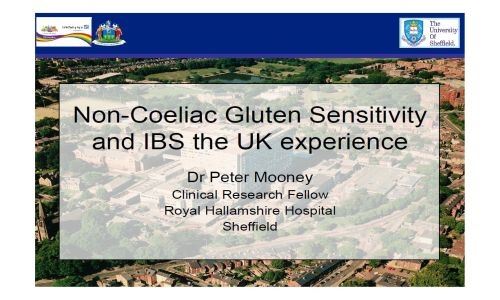
Non-Coeliac Gluten Sensitivity and IBS: The UK experience (2013)
Dr. Peter Mooney
Clinical Research Fellow
Royal Hallamshire Hospital
Sheffield, UK
15e International Celiac Disease Symposium à Chicago du 22 au 25 septembre 2013
Clinical Research Fellow
Royal Hallamshire Hospital
Sheffield, UK
15e International Celiac Disease Symposium à Chicago du 22 au 25 septembre 2013

IBS & Gluten Sensitivity: The European experience (2013)
Antonio Carroccio
Direttore Medicina Interna presso ASP AG
Palermo, ...

IBS & Gluten Sensitivity: The North American Experience (2013)
Ciarán P. Kelly, M.D.
Medical Director, Celiac Center
Beth Israel De...

Non-Coeliac Gluten Sensitivity and IBS: The UK experience (2013)
Dr. Peter Mooney
Clinical Research Fellow
Royal Hallamshire Hospital...

Non-celiac gluten sensitivity has narrowed the spectrum of irritable bowel syndrome: A double-blind randomized placebo-controlled trial
The aim of this study was to evaluate the effect of a gluten free diet on gastrointestinal symptoms in a group of Iranian patients with IBS using a double-blind randomised, placebo-controlled trial design.
148 adult patients with IBS and fulfilling the Rome III criteria were initially recruited from a private gastroenterology clinic in Tehran. Patients excluded from the study included those with a diagnosis of coeliac disease or inflammatory bowel disease, those who were already following or had previously followed a wheat or gluten free diet, those using drugs for depression/ anxiety, those using non-steroidal anti-inflammatory drugs, and those with abnormal electrolytes levels or thyroid function tests. The resulting patient sample eligible to commence a gluten free diet was 102, of these 22 patients withdrew from the study on the basis that the diet was too difficult to follow. A further 8 patients found relief from a gluten free diet but decided to withdraw as they were unprepared to follow the diet strictly. The remaining 72 patients completed the study (19 males and 53 females). Patients were randomly assigned to the gluten group (35 patients; 6 males and 29 females; mean age 44.5 +/- 10 years) or the placebo group (37 patients; 13 males and 24 females; mean age 43.2 +/- 17 years). There was no statistical difference between the 2 groups in terms of IBS sub-type. Patients completed a visual analogue symptom questionnaire at baseline to investigate primary outcomes including bloating, abdominal pain, defecation satisfaction, nausea, fatigue, and overall symptoms. Serum markers were measured for IgA anti-tTG, IgA anti-gliadin and IgG anti-gliadin antibodies, HLA typing was also performed for all patients.
All 72 patients then commenced a 6 week gluten free diet with weekly assessment by a dietitian to monitor and support compliance. After 6 weeks the gluten group were each asked to consume 100g/day (2 x 50g doses) of gluten powder (FODMAP free), the placebo group were asked to consume 100g/ day of gluten-free powder (rice flour, corn starch and glucose). Powders were mixed with warm water and consumed with breakfast and tea each day for a further 6 weeks. All patients remained on a gluten free diet for this second 6 week phase of the study.
After the 6 week challenge phase, symptoms were controlled in 25.7% of the gluten-containing group v’s 83.8% in the placebo group, indicating that 26 of the 35 patients in the gluten group became symptomatic on gluten challenge. Symptoms increased significantly in the gluten group, particularly for bloating and abdominal pain within 1 week of commencing the gluten challenge. No statistical difference was noted in serum antibody levels after gluten challenge. The authors of this study conclude that there is growing evidence that gastrointestinal symptoms in many IBS patients may be improved after gluten exclusion and differentiation between patients with IBS responsive to FODMAP restriction and those with Non-coeliac gluten sensitivity is important. This is particularly the case since evidence is emerging that a low FODMAP diet may reduce numbers of favourable bacteria in the gut (1,2). The authors went on to suggest a potential algorithm for the management of IBS patients fulfilling Rome III criteria that first implements a 6 week gluten free diet and goes on to recommend further carbohydrate restriction only in non-responders.
1. Staudacher HM, Lomer MC, Anderson JL et al. Fermentable carbohydrate restriction reduces luminal bifidobacteria and gastrointestinal symptoms in patients with irritable bowel syndrome. J Nutr 2012; 142: 1510-1518
2. Halmos EP, Christopherson CT, Bird AR et al. Diet that differ in their FODMAP content alter the colonic luminal microenvironment. Gut 2015; 64:93-100
Resource: Nutrients June 2015; 7:4542-4554
Shahbazkhani B, Sadeghi A, Malekzadeh R et al
148 adult patients with IBS and fulfilling the Rome III criteria were initially recruited from a private gastroenterology clinic in Tehran. Patients excluded from the study included those with a diagnosis of coeliac disease or inflammatory bowel disease, those who were already following or had previously followed a wheat or gluten free diet, those using drugs for depression/ anxiety, those using non-steroidal anti-inflammatory drugs, and those with abnormal electrolytes levels or thyroid function tests. The resulting patient sample eligible to commence a gluten free diet was 102, of these 22 patients withdrew from the study on the basis that the diet was too difficult to follow. A further 8 patients found relief from a gluten free diet but decided to withdraw as they were unprepared to follow the diet strictly. The remaining 72 patients completed the study (19 males and 53 females). Patients were randomly assigned to the gluten group (35 patients; 6 males and 29 females; mean age 44.5 +/- 10 years) or the placebo group (37 patients; 13 males and 24 females; mean age 43.2 +/- 17 years). There was no statistical difference between the 2 groups in terms of IBS sub-type. Patients completed a visual analogue symptom questionnaire at baseline to investigate primary outcomes including bloating, abdominal pain, defecation satisfaction, nausea, fatigue, and overall symptoms. Serum markers were measured for IgA anti-tTG, IgA anti-gliadin and IgG anti-gliadin antibodies, HLA typing was also performed for all patients.
All 72 patients then commenced a 6 week gluten free diet with weekly assessment by a dietitian to monitor and support compliance. After 6 weeks the gluten group were each asked to consume 100g/day (2 x 50g doses) of gluten powder (FODMAP free), the placebo group were asked to consume 100g/ day of gluten-free powder (rice flour, corn starch and glucose). Powders were mixed with warm water and consumed with breakfast and tea each day for a further 6 weeks. All patients remained on a gluten free diet for this second 6 week phase of the study.
After the 6 week challenge phase, symptoms were controlled in 25.7% of the gluten-containing group v’s 83.8% in the placebo group, indicating that 26 of the 35 patients in the gluten group became symptomatic on gluten challenge. Symptoms increased significantly in the gluten group, particularly for bloating and abdominal pain within 1 week of commencing the gluten challenge. No statistical difference was noted in serum antibody levels after gluten challenge. The authors of this study conclude that there is growing evidence that gastrointestinal symptoms in many IBS patients may be improved after gluten exclusion and differentiation between patients with IBS responsive to FODMAP restriction and those with Non-coeliac gluten sensitivity is important. This is particularly the case since evidence is emerging that a low FODMAP diet may reduce numbers of favourable bacteria in the gut (1,2). The authors went on to suggest a potential algorithm for the management of IBS patients fulfilling Rome III criteria that first implements a 6 week gluten free diet and goes on to recommend further carbohydrate restriction only in non-responders.
1. Staudacher HM, Lomer MC, Anderson JL et al. Fermentable carbohydrate restriction reduces luminal bifidobacteria and gastrointestinal symptoms in patients with irritable bowel syndrome. J Nutr 2012; 142: 1510-1518
2. Halmos EP, Christopherson CT, Bird AR et al. Diet that differ in their FODMAP content alter the colonic luminal microenvironment. Gut 2015; 64:93-100
Resource: Nutrients June 2015; 7:4542-4554
Shahbazkhani B, Sadeghi A, Malekzadeh R et al

Small Amounts of Gluten in Subjects With Suspected Nonceliac Gluten Sensitivity: A Randomized, Double-Blind, Placebo-Controlled, Cross-Over Trial.
Abstract
BACKGROUND & AIMS:
There is debate over the existence of nonceliac gluten sensitivity (NCGS) intestinal and extraintestinal symptoms in response to ingestion of gluten-containing foods by people without celiac disease or wheat allergy. We performed a randomized, double-blind, placebo-controlled, cross-over trial to determine the effects of administration of low doses of gluten to subjects with suspected NCGS.
METHODS:
We enrolled 61 adults without celiac disease or a wheat allergy who believed ingestion of gluten-containing food to be the cause of their intestinal and extraintestinal symptoms. Participants were assigned randomly to groups given either 4.375 g/day gluten or rice starch (placebo) for 1 week, each via gastrosoluble capsules. After a 1-week gluten-free diet, participants crossed over to the other group. The primary outcome was the change in overall (intestinal and extraintestinal) symptoms, determined by established scoring systems, between gluten and placebo intake. A secondary outcome was the change in individual symptom scores between gluten vs placebo.
RESULTS:
According to the per-protocol analysis of data from the 59 patients who completed the trial, intake of gluten significantly increased overall symptoms compared with placebo (P = .034). Abdominal bloating (P = .040) and pain (P = .047), among the intestinal symptoms, and foggy mind (P = .019), depression (P = .020), and aphthous stomatitis (P = .025), among the extraintestinal symptoms, were significantly more severe when subjects received gluten than placebo.
CONCLUSIONS:
In a cross-over trial of subjects with suspected NCGS, the severity of overall symptoms increased significantly during 1 week of intake of small amounts of gluten, compared with placebo.
Resource: Clin Gastroenterol Hepatol. 2015 Sep;13(9):1604-1612.
Di Sabatino A, Volta U, Salvatore C, Biancheri P, Caio G, De Giorgio R, Di Stefano M, Corazza GR.
BACKGROUND & AIMS:
There is debate over the existence of nonceliac gluten sensitivity (NCGS) intestinal and extraintestinal symptoms in response to ingestion of gluten-containing foods by people without celiac disease or wheat allergy. We performed a randomized, double-blind, placebo-controlled, cross-over trial to determine the effects of administration of low doses of gluten to subjects with suspected NCGS.
METHODS:
We enrolled 61 adults without celiac disease or a wheat allergy who believed ingestion of gluten-containing food to be the cause of their intestinal and extraintestinal symptoms. Participants were assigned randomly to groups given either 4.375 g/day gluten or rice starch (placebo) for 1 week, each via gastrosoluble capsules. After a 1-week gluten-free diet, participants crossed over to the other group. The primary outcome was the change in overall (intestinal and extraintestinal) symptoms, determined by established scoring systems, between gluten and placebo intake. A secondary outcome was the change in individual symptom scores between gluten vs placebo.
RESULTS:
According to the per-protocol analysis of data from the 59 patients who completed the trial, intake of gluten significantly increased overall symptoms compared with placebo (P = .034). Abdominal bloating (P = .040) and pain (P = .047), among the intestinal symptoms, and foggy mind (P = .019), depression (P = .020), and aphthous stomatitis (P = .025), among the extraintestinal symptoms, were significantly more severe when subjects received gluten than placebo.
CONCLUSIONS:
In a cross-over trial of subjects with suspected NCGS, the severity of overall symptoms increased significantly during 1 week of intake of small amounts of gluten, compared with placebo.
Resource: Clin Gastroenterol Hepatol. 2015 Sep;13(9):1604-1612.
Di Sabatino A, Volta U, Salvatore C, Biancheri P, Caio G, De Giorgio R, Di Stefano M, Corazza GR.

A Study Evaluating the Bidirectional Relationship Between Inflammatory Bowel Disease and Self-reported Non-coeliac Gluten Sensitivity.
Recent research indicates widespread use of a gluten free diet (GFD) amongst patients with Inflammatory Bowel Disease (IBD) with improvement of symptoms and disease course noted by the majority who embark on this dietary change. The aim of this study was to evaluate the prevalence of self-reported non-coeliac gluten sensitivity (SR-NCGS) in a cohort of British patients with IBD and conversely to determine the prevalence of IBD amongst individuals presenting with SR-NCGS. Three groups of patients attending the Royal Hallamshire Gastroenterology Clinic were enrolled in this study and asked to complete a validated questionnaire collecting demographic data and past/ current use of a gluten free diet; one group with IBD (n=145; 75 with Crohn’s disease and 70 with ulcerative colitis) and 2 control groups; one with irritable bowel syndrome (IBS) diagnosed using Rome III criteria (n=59) and one group with dyspepsia, attending for endoscopy (n=109). SR-NCGS was defined as self-reported gluten sensitivity in the absence of coeliac disease. Current disease extent and severity amongst IBD patients was assessed using a validated questionnaire and medical records. Patients with IBS were the most likely to have SR-NCGS (42.4%), followed by IBD patients (27.6%) and dyspeptic patients (17.4%). 15.3% of IBS patients and 13.1% of IBD patients had tried a gluten free diet for the management of symptoms, versus just 1.8% of dyspeptic patients. The current use of a gluten free diet was recorded in 11.9% of IBS patients, 13.1% of IBD patients and 0.9% of dyspeptic patients. Diagnostic outcome data from 200 patients with SR-NCGS (in the absence of CD or wheat allergy) referred to the Royal Halllamshire between 2006 and 2013 was reviewed in order to investigate the prevalence of IBD in this group. 1.5% (n=3) of patients were found to have IBD.
No significant difference was found between patients with ulcerative colitis and Crohn’s disease in terms of prevalence on SR-NCGS and gluten free diet usage. However, IBD patients with SR-NCGS were significantly more likely to have stricturing disease (p=0.046) and more active disease (p=0.002) as measured by the Crohn’s Disease Activity Index score. This indicates that the presence of SR-NCGS may be a marker for clinicians of underlying severe/ structuring disease. The mechanism for the potential therapeutic effect of a gluten free diet in IBD is not well understood. The volume/ physical properties and ‘higher residue’ nature of gluten-containing foods may lead patients to avoid such products. It is also possible that an unidentified immunological mechanism may contribute to the relief experienced by patients choosing to reduce or eliminate their intake of gluten. The absence of diagnostic markers for NCGS mean it is unclear whether individuals with IBD who self-report gluten sensitivity are sensitive the gluten or other components of wheat such as mannans, amylase-trypsin inhibitors or FODMAPs. Further studies are needed to understand whether a gluten-free diet, or indeed a wider wheat free diet may be a valuable dietetic intervention in selected patients with IBD.
Resource: Inflammatory Bowel Disease 2015 Feb 24 epub ahead of print.
Aziz A, Branchi F, Pearson K, Priest J, Sanders D.
No significant difference was found between patients with ulcerative colitis and Crohn’s disease in terms of prevalence on SR-NCGS and gluten free diet usage. However, IBD patients with SR-NCGS were significantly more likely to have stricturing disease (p=0.046) and more active disease (p=0.002) as measured by the Crohn’s Disease Activity Index score. This indicates that the presence of SR-NCGS may be a marker for clinicians of underlying severe/ structuring disease. The mechanism for the potential therapeutic effect of a gluten free diet in IBD is not well understood. The volume/ physical properties and ‘higher residue’ nature of gluten-containing foods may lead patients to avoid such products. It is also possible that an unidentified immunological mechanism may contribute to the relief experienced by patients choosing to reduce or eliminate their intake of gluten. The absence of diagnostic markers for NCGS mean it is unclear whether individuals with IBD who self-report gluten sensitivity are sensitive the gluten or other components of wheat such as mannans, amylase-trypsin inhibitors or FODMAPs. Further studies are needed to understand whether a gluten-free diet, or indeed a wider wheat free diet may be a valuable dietetic intervention in selected patients with IBD.
Resource: Inflammatory Bowel Disease 2015 Feb 24 epub ahead of print.
Aziz A, Branchi F, Pearson K, Priest J, Sanders D.

Non-celiac gluten sensitivity has narrowed the spectrum of irritable bowel syndrome: A double-blind randomized placebo-controlled trial
The aim of this study was to evaluate the effect of a gluten free diet...

Small Amounts of Gluten in Subjects With Suspected Nonceliac Gluten Sensitivity: A Randomized, Double-Blind, Placebo-Controlled, Cross-Over Trial.
Abstract
BACKGROUND & AIMS:
There is debate over the existence of ...

A Study Evaluating the Bidirectional Relationship Between Inflammatory Bowel Disease and Self-reported Non-coeliac Gluten Sensitivity.
Recent research indicates widespread use of a gluten free diet (GFD) a...
What is the connection between NCGS and IBS?
Professor David Sanders
Consultant Gastroenterologist
Royal Hallamshire Hospital & the University of Sheffield
The United Kingdom
At the Expert Meeting 2014 in Salerno, Italy.
Consultant Gastroenterologist
Royal Hallamshire Hospital & the University of Sheffield
The United Kingdom
At the Expert Meeting 2014 in Salerno, Italy.
Is there a relationship between IBS and NCGS?
Reiner Ullrich, MD
Universitätsmedizin Berlin
Campus Benjamin Franklin,
Medizinische Klinik für Gastroenterologie
12203 Berlin, Germany
At the Expert Meeting 2014 in Salerno, Italy
Universitätsmedizin Berlin
Campus Benjamin Franklin,
Medizinische Klinik für Gastroenterologie
12203 Berlin, Germany
At the Expert Meeting 2014 in Salerno, Italy
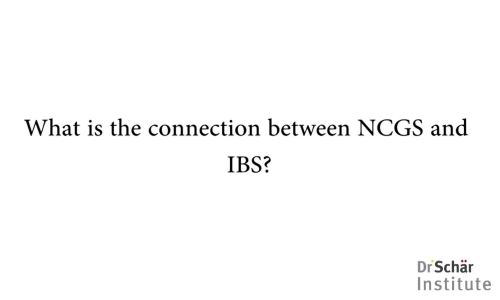
What is the connection between NCGS and IBS?
Professor David Sanders
Consultant Gastroenterologist
Royal Hallamsh...
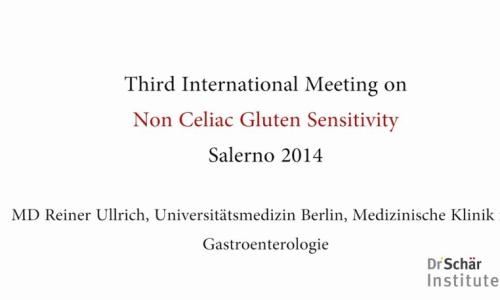
Is there a relationship between IBS and NCGS?
Reiner Ullrich, MD
Universitätsmedizin Berlin
Campus Benjamin Frankl...
www.drschaer-institute.com
